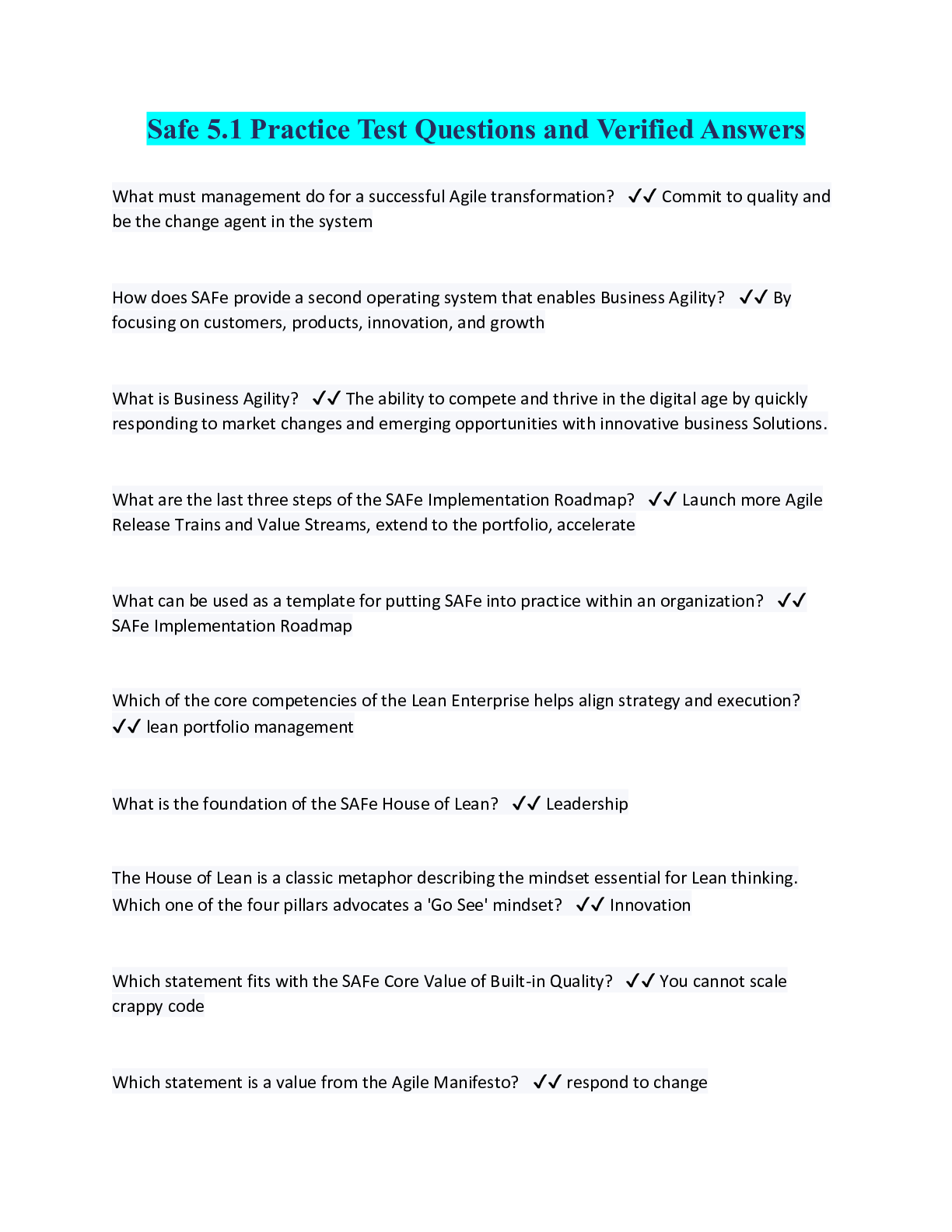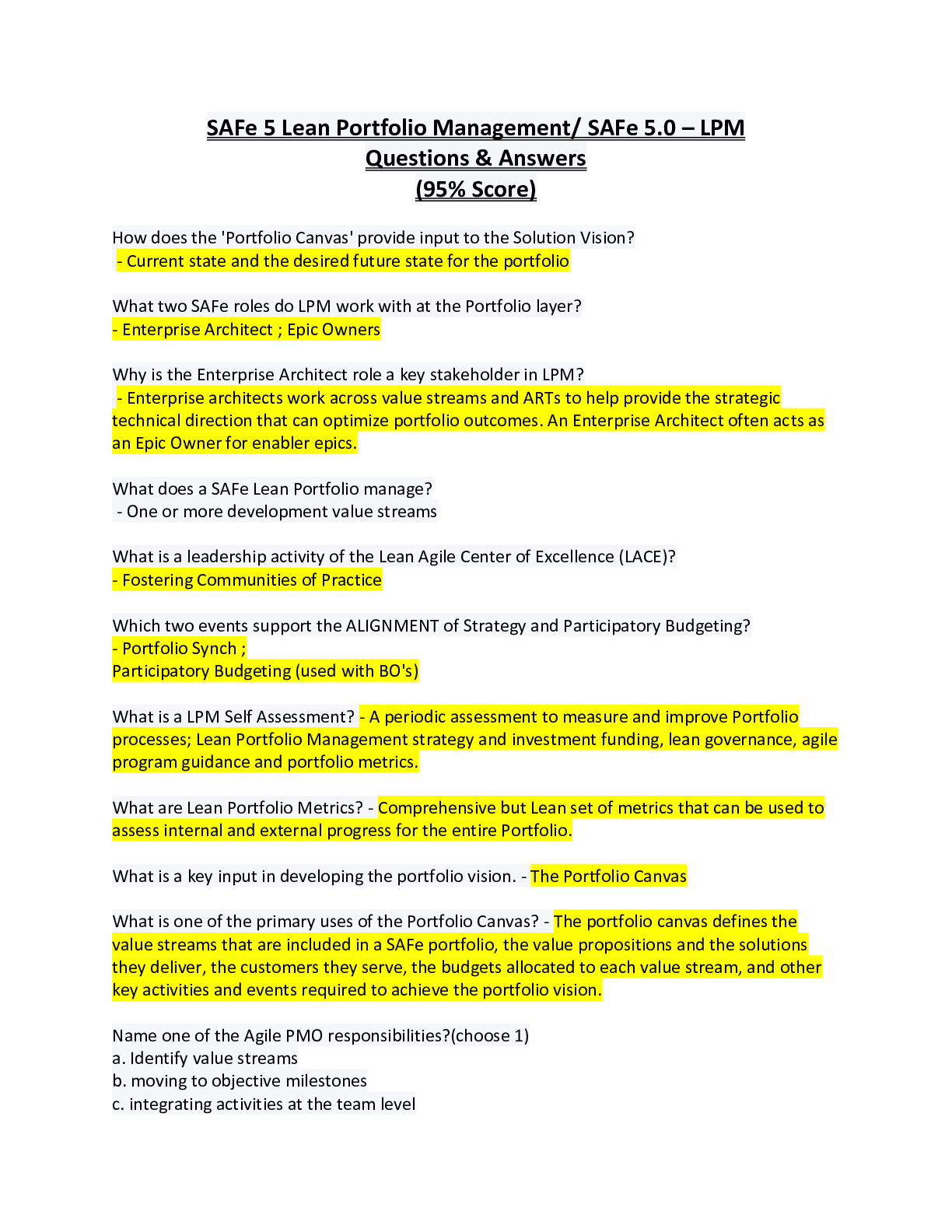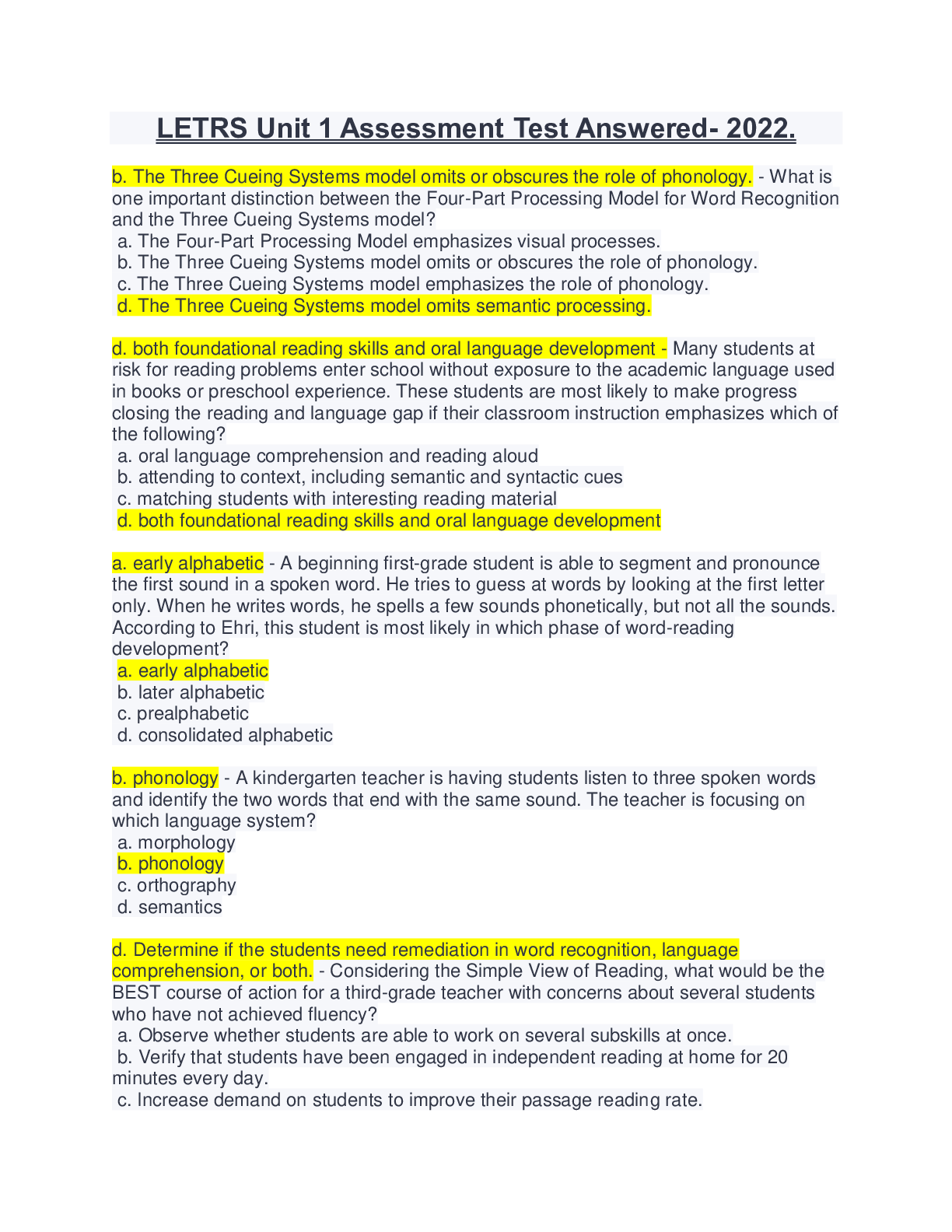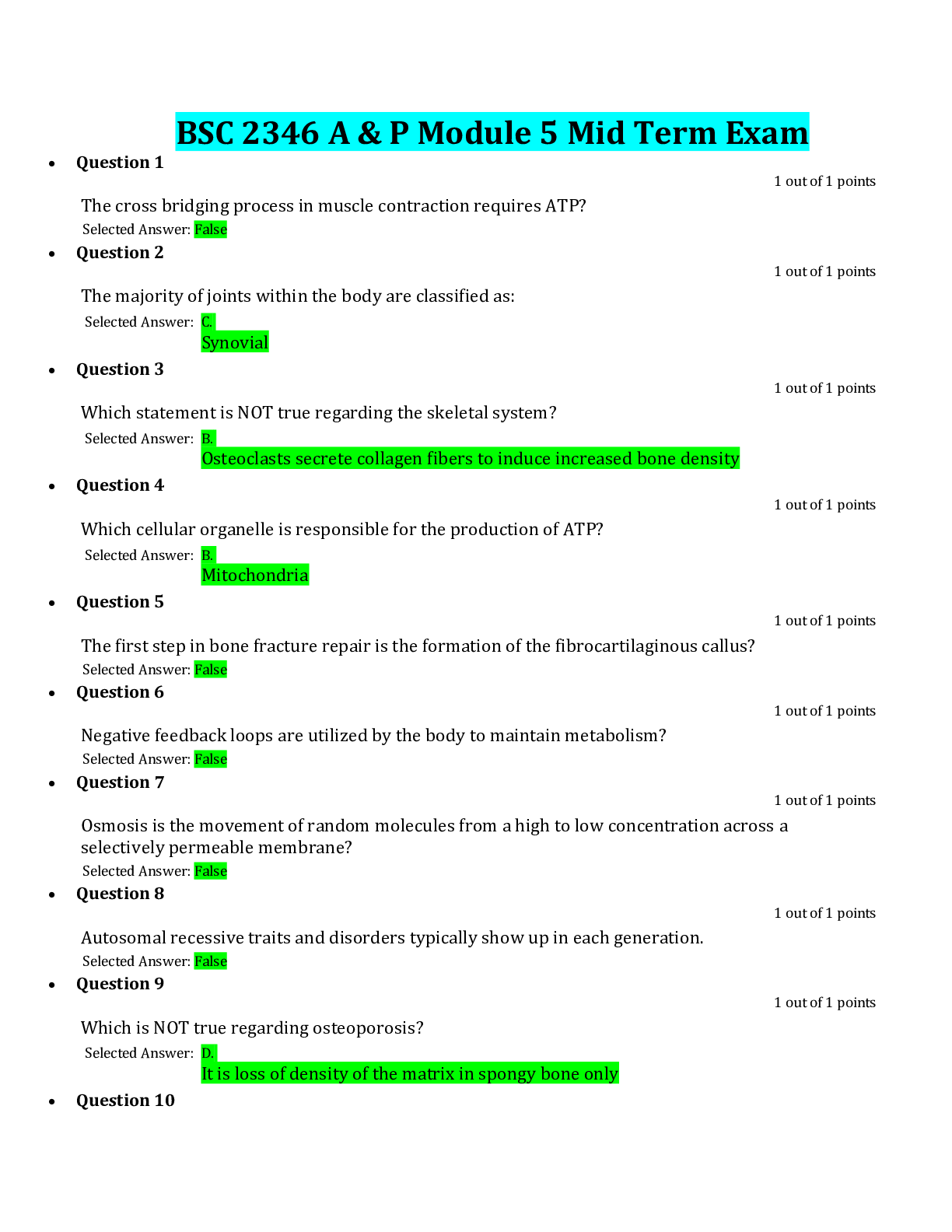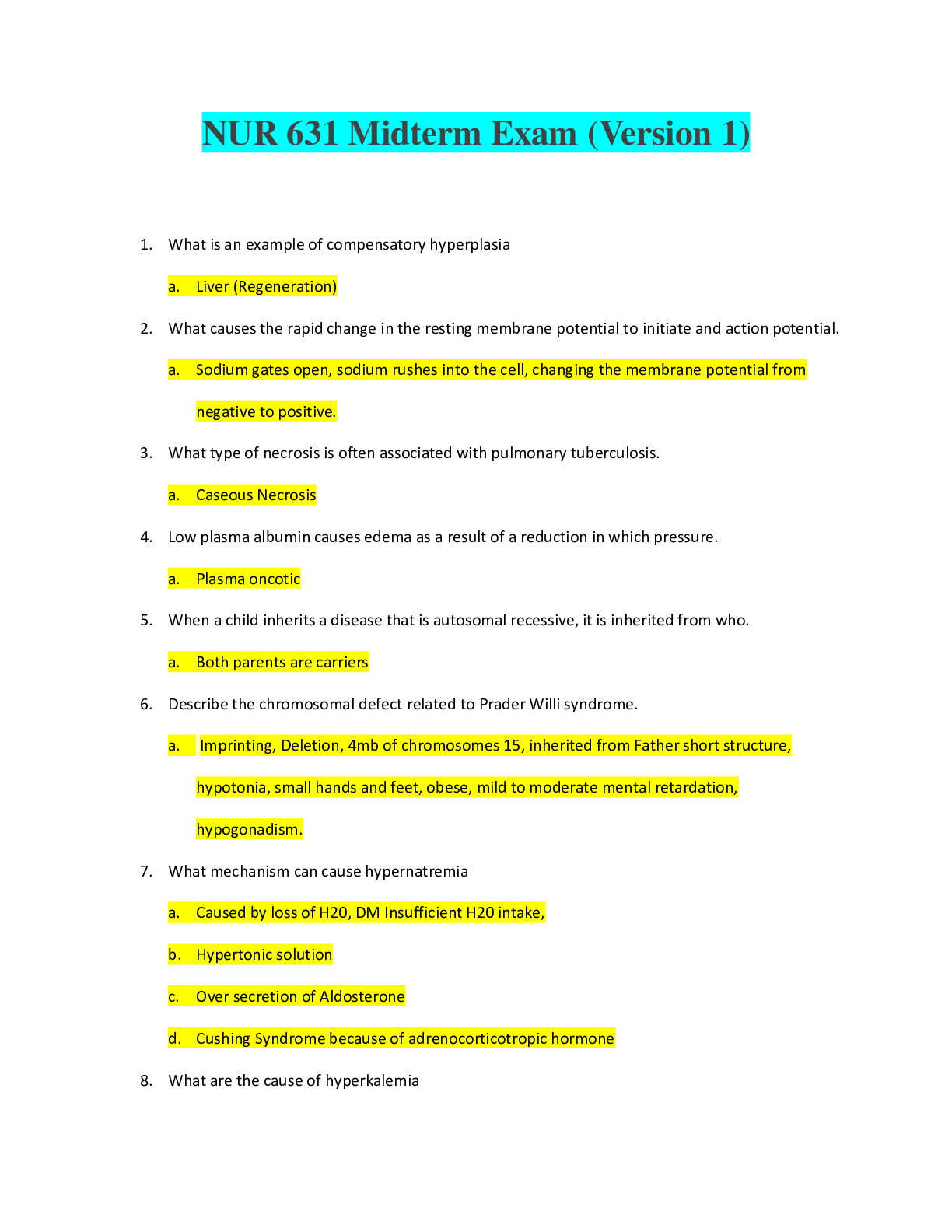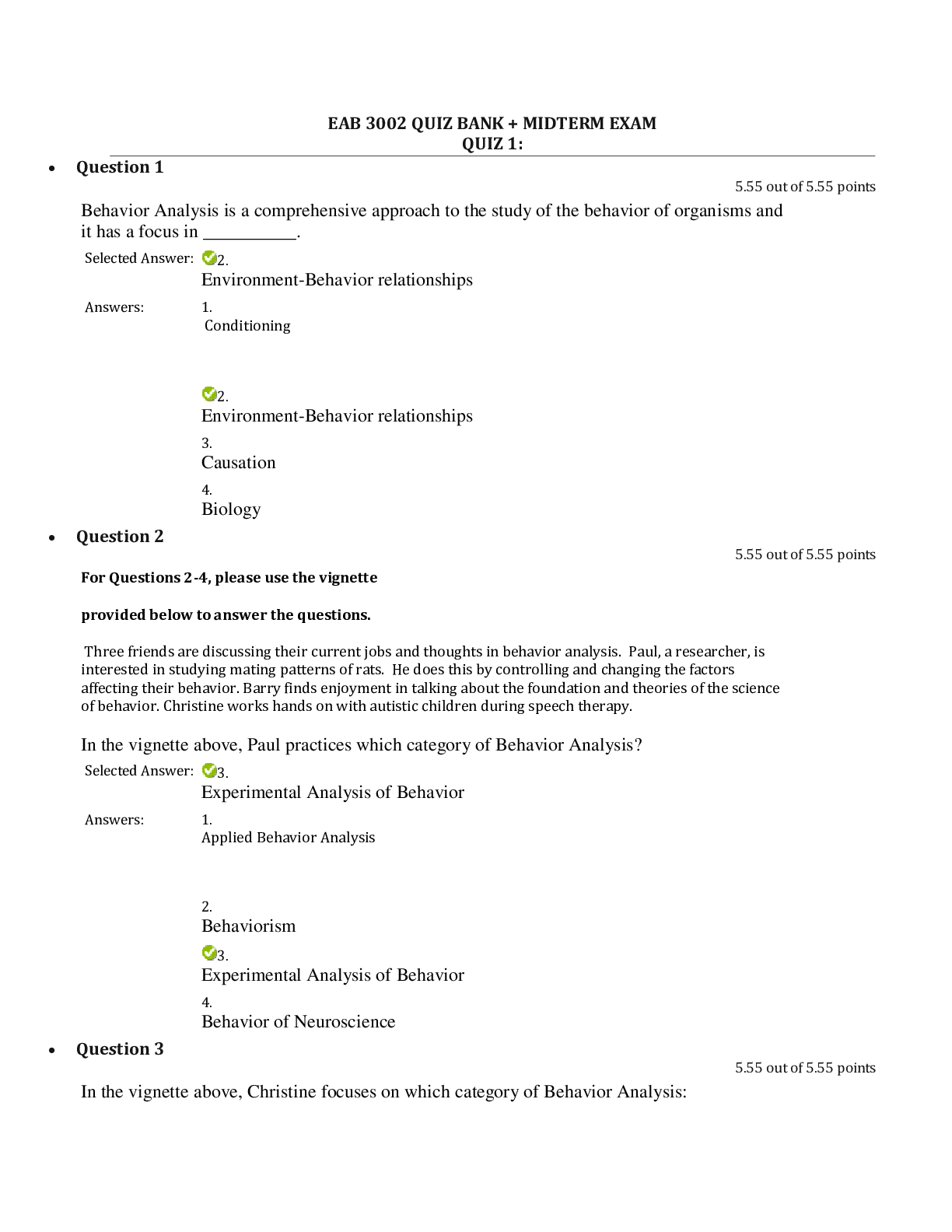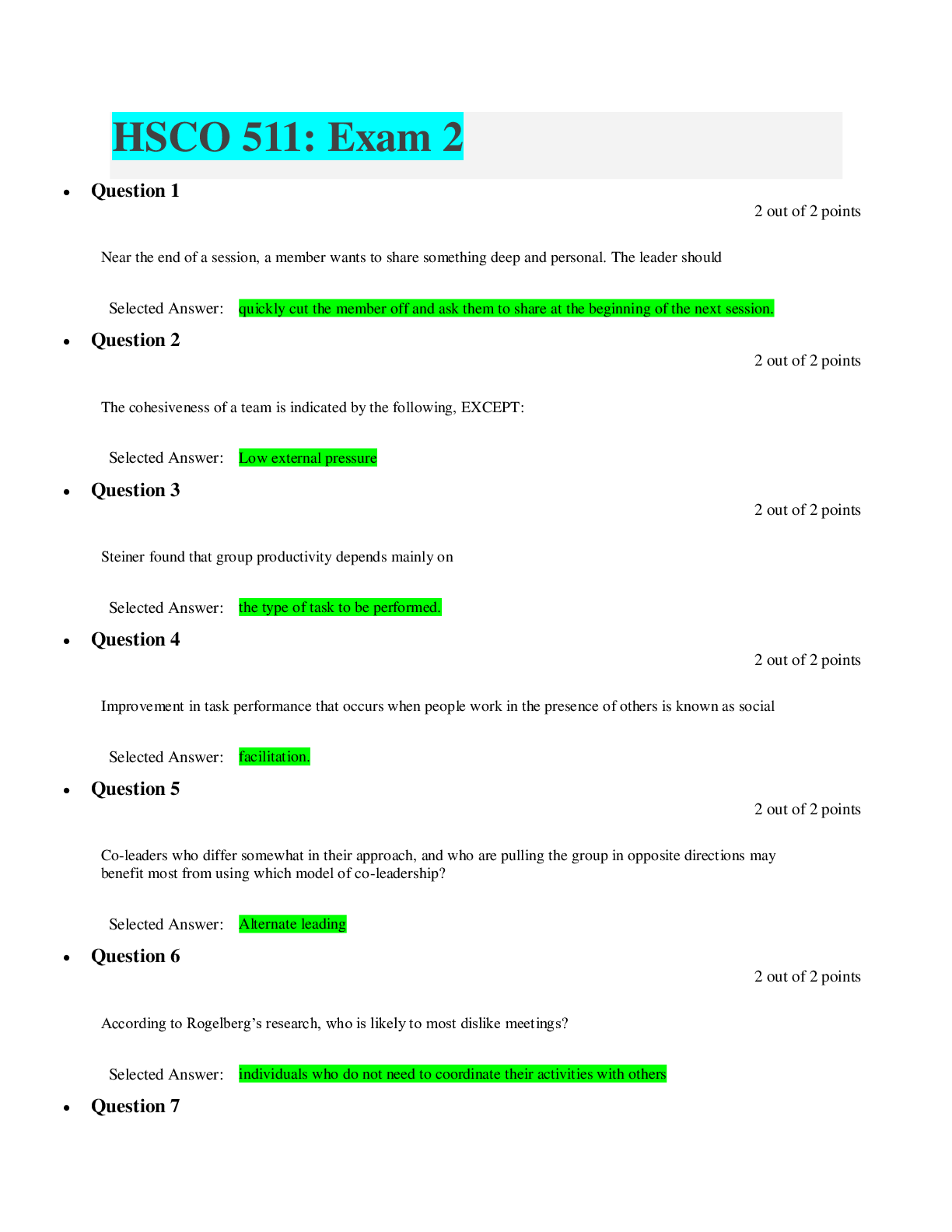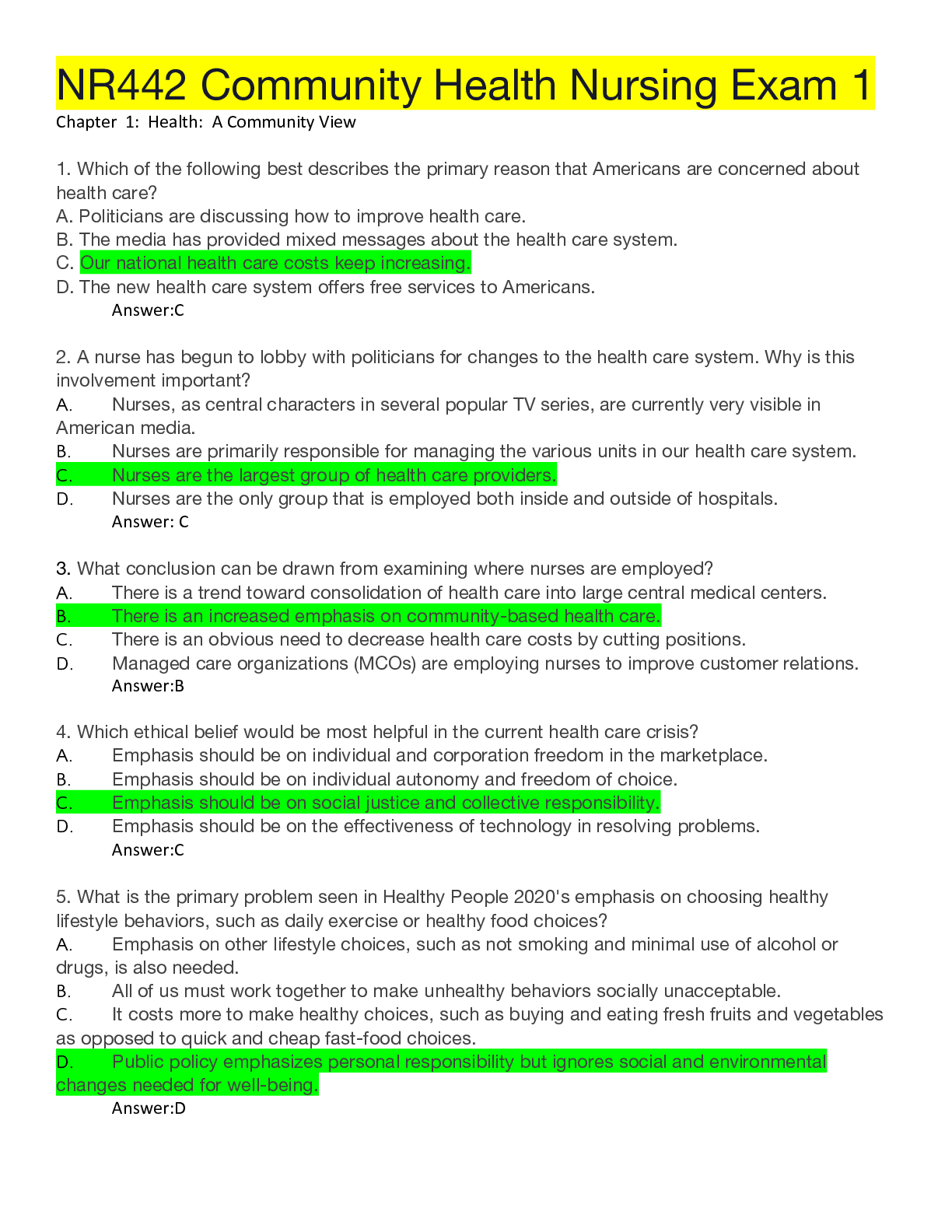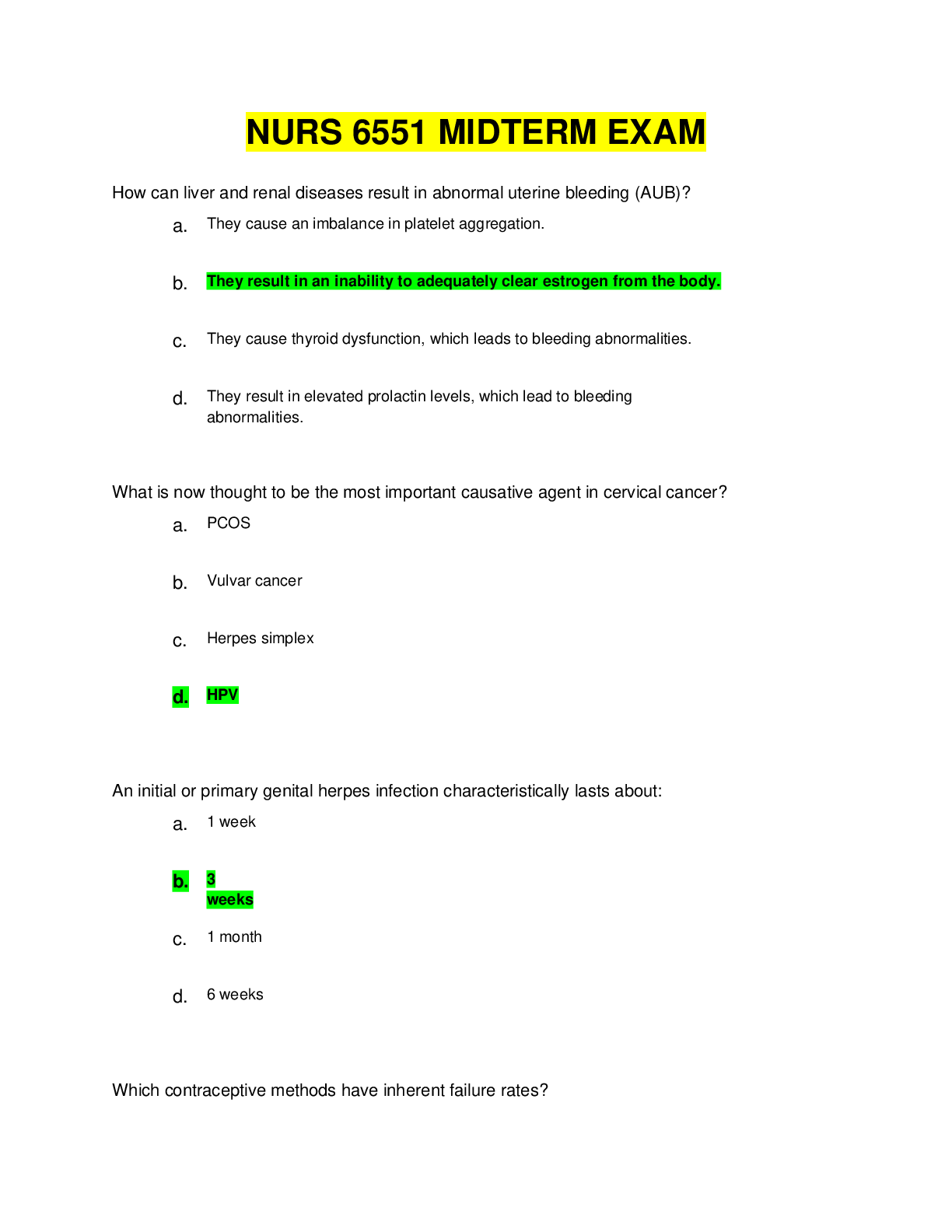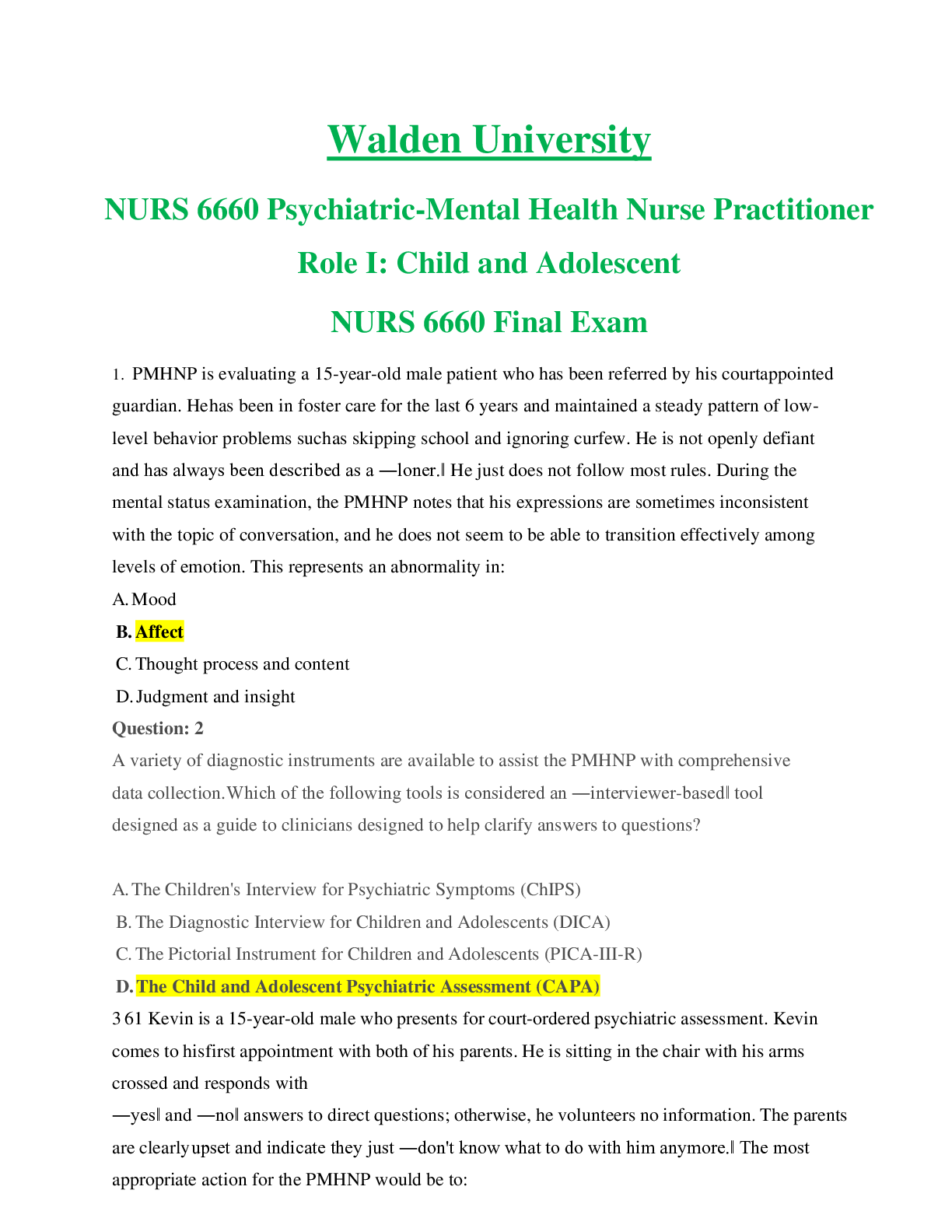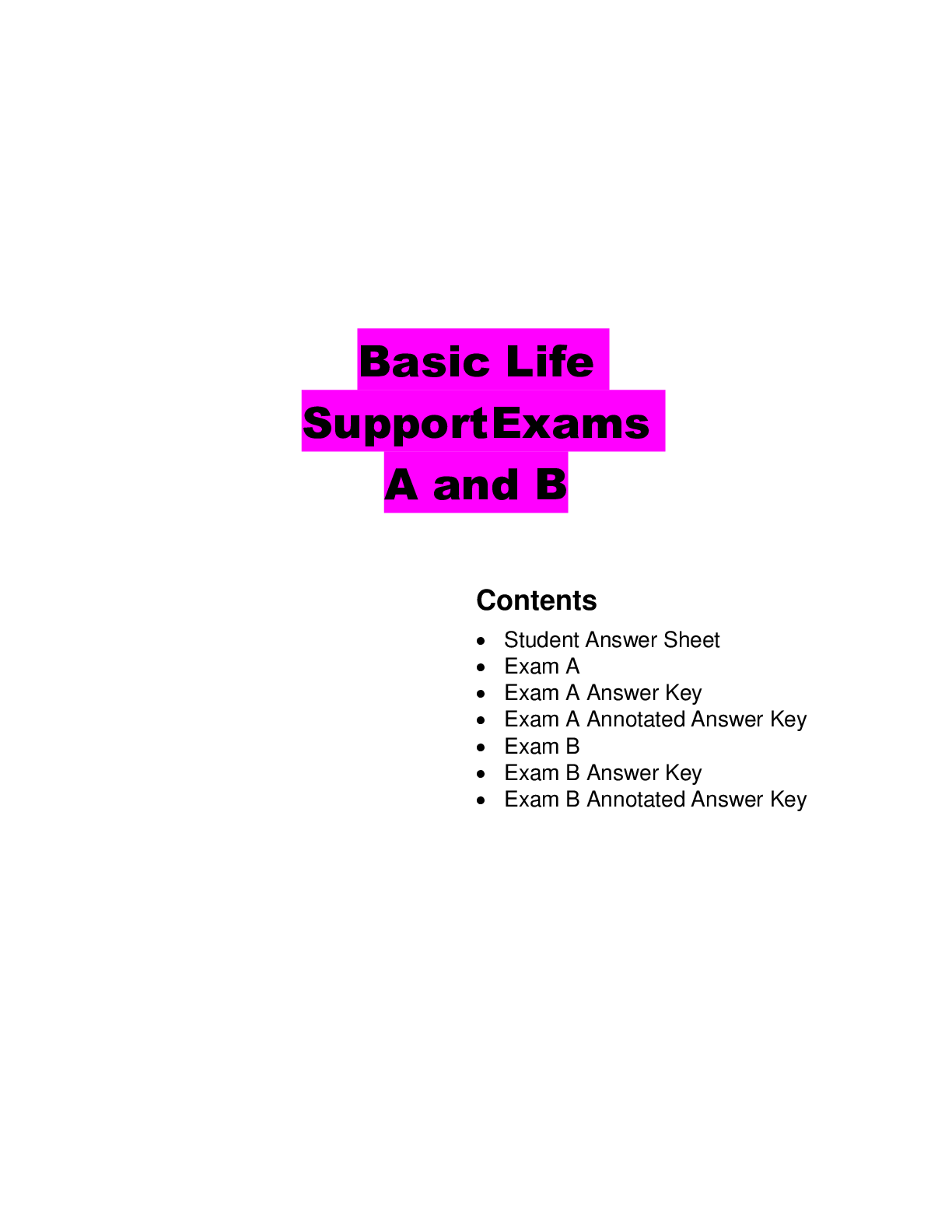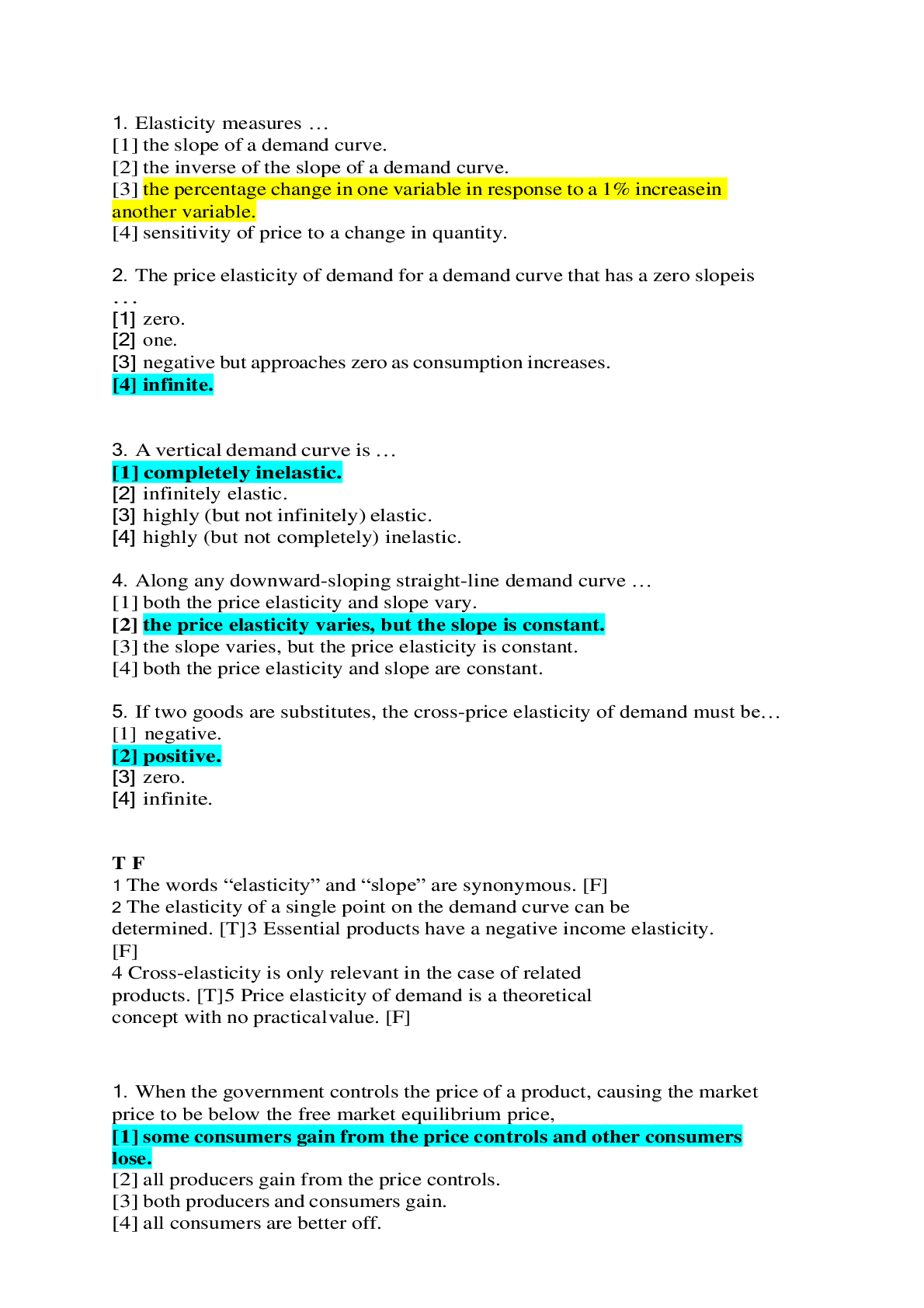*NURSING > EXAM > NUR 2207 -RNPedia Personality Disorders Test, Latest complete solutions with Answers and Rationales (All)
NUR 2207 -RNPedia Personality Disorders Test, Latest complete solutions with Answers and Rationales (2019/20).
Document Content and Description Below
NUR 2207 - RNPedia Personality Disorders Test (Answers and Rationales below Questions-all correct) 1) The nursing diagnosis that would be most appropriate for a 22-year old client who uses ritua... listic behavior would be: A. Ineffective coping B. Impaired adjustment C. personal identity disturbance D. Sensory/perceptual alterations 2) A psychiatrist prescribes an anti-obsessional agent for a client who is using ritualistic behavior. A common anti-anxiety medication used for this type of client would be: A. Fluvoxamine (Luvox) B. Benztropine (Cogentin) C. Amantadine (Symmetrel) D. Diphenhydramine (Benadryl) 3) A 20-year old college student has been brought to the psychiatric hospital by her parents. Her admitting diagnosis is borderline personality disorder. When talking with the parents, which information would the nurse expect to be included in the client’s history? Select all that apply. A. Impulsiveness B. Lability of mood C. Ritualistic behavior D. psychomotor retardation E. self-destructive behavior 4) A hospitalized client, diagnosed with a borderline personality disorder, consistently breaks the unit’s rules. This behavior should be confronted because it will help the client: A. Control anger B. reduce anxiety C. Set realistic goals D. Become more self-aware 5) When working with the nurse during the orientation phase of the relationship, a client with a borderline personality disorder would probably have the most difficulty in: A. Controlling anxiety B. terminating the session on time C. Accepting the psychiatric diagnosis D. Setting mutual goals for the relationship 6) A client with a diagnosis of borderline personality disorder has negative feelings toward the other clients on the unit and considers them all to be “bad.” The nurse understands this defense is known as: A. Splitting B. Ambivalence C. Passive aggression D. Reaction formation 7) The client with antisocial personality disorder: A. Suffers from a great deal of anxiety B. Is generally unable to postpone gratification C. Rapidly learns by experience and punishment D. Has a great sense of responsibility toward others 8) A person with antisocial personality disorder has difficulty relating to others because of never having learned to: A. Count on others B. Empathize with others C. Be dependent on others D. Communicate with others socially 9) A young, handsome man with a diagnosis of antisocial personality disorder is being discharged from the hospital next week. He asks the nurse for her phone number so that he can call her for a date. The nurse’s best response would be: A. “We are not permitted to date clients.” B. “No, you are a client and I am a nurse.” C. “I like you, but our relationship is professional.” D. “It’s against my professional ethics to date clients.” 10) When caring for a client with a diagnosis of schizotypal personality disorder, the nurse should: A. Set limits on manipulative behavior B. encourage participation in group therapy C. Respect the client’s needs for social isolation D. Understand that seductive behavior is expected. 11) A nurse is orienting a new client to the unit when another client rushes down the hallway and asks the nurse to sit down and talk. The client requesting the nurse’s attention is extremely manipulative and uses socially acting-out behaviors when demands are unmet. The nurse should: A. Suggest that the client requesting attention speak with another staff member B. Leave the new client and talk with the other client to avoid precipitating acting out behavior C. Tell the interrupting client to sit down and be patient, stating, “I’ll be back as soon as possible.” D. Introduce the two clients and suggest that the client join the new client and the nurse on the tour 12) A client with a diagnosis of narcissistic personality disorder has been given a day pass from the psychiatric hospital. The client is due to return at 6pm. At 5pm the client telephones the nurse in charge of the unit and says “6 o’clock is too early. I feel like coming back at 7:30.” The nurse would be most therapeutic by telling the client to: A. Return immediately, to demonstrate control B. Return on time or restrictions will be imposed C. come back at 6:45, as a compromise to set limits D. Come back as soon as possible or the police will be sent 13) An adult client with a borderline personality disorder become nauseated and vomits immediately after drinking after drinking 2 ounces of shampoo as a suicide gesture. The most appropriate initial response by the nurse would be to: A. Promptly notify the attending physician B. Immediately initiate suicide precautions C. Sit quietly with the client until nausea and vomiting subsides D. Assess the client’s vital signs and administer syrup of ipecac 14) A nurse notices that a client is mistrustful and shows hostile behavior. Which of the following types of personality disorder is associated with these characteristics? A. Antisocial B. Avoidant C. Borderline D. Paranoid 15) Which of the following statements is typical for a client diagnosed with a personality disorder? A. “I understand you’re the one to blame.” B. “I must be seen first; it’s not negotiable.” C. “I see nothing humorous in this situation.” D. “I wish someone would select the outfit for me.” 16) Which of the following characteristics is expected for a client with paranoid personality disorder who receives bad news? A. The client is overly dramatic after hearing the facts B. The client focuses on self to not become over-anxious C. The client responds from a rational, objective point of view D. The client doesn’t spend time thinking about the information. 17) Which of the following types of behavior is expected from a client diagnosed with a paranoid personality disorder? A. Eccentric B. exploitative C. Hypersensitive D. Seductive 18) Which of the following interventions is important for a client with paranoid personality disorder taking olanzapine (Zyprexa)? A. Explain effects of serotonin syndrome B. Teach the client to watch for extrapyramidal adverse reactions C. Explain that the drug is less effective if the client smokes D. Discuss the need to report paradoxical effects such as euphoria. 19) A client with antisocial personality is trying to convince a nurse that he deserves special privileges and that an exception to the rules should be made for him. Which of the following responses is the most appropriate? A. “I believe we need to sit down and talk about this.” B. “Don’t you know better than to try to bend the rules?” C. “What you’re asking me to do is unacceptable.” D. “Why don’t you bring this request to the community meeting?” 20) A nurse notices other clients on the unit avoiding a client diagnosed with antisocial personality disorder. When discussing appropriate behavior in group therapy, which of the following comments is expected about this client by his peers? A. Lack of honesty B. Belief in superstitions C. Show of temper tantrums D. Constant need for attention 21) Which of the following characteristics or client histories substantiates a diagnosis of antisocial personality disorder? A. Delusional thinking B. Feelings of inferiority C. Disorganized thinking D. Multiple criminal charges 22) A client with borderline personality disorder is admitted to the unit after slashing his wrist. Which of the following goals is most important after promoting safety? A. Establish a therapeutic relationship with the client B. Identify whether splitting is present in the client’s thoughts C. Talk about the client’s acting out and self-destructive tendencies. D. Encourage the client to understand why he blames others 23) Which of the following characteristics or situations is indicated when a client with borderline personality disorder has a crisis? A. Antisocial behavior B. Suspicious behavior C. Relationship problems D. Auditory hallucinations 24) Which of the following assessment findings is seen in a client diagnosed with borderline personality disorder? A. Abrasions in various healing stages B. intermittent episodes of hypertension C. Alternating tachycardia and bradycardia D. Mild state of euphoria with disorientation 25) In planning care for a client with borderline personality disorder, a nurse must be aware that this client is prone to develop which of the following conditions? A. Binge eating B. Memory loss C. Cult membership D. Delusional thinking 26) Which of the following statements is expected from a client with borderline personality disorder with a history of dysfunctional relationships? A. “I won’t get involved in another relationship.” B. “I’m determined to look for the perfect partner.” C. “I’ve decided to use better communication skills.” D. “I’m going to be an equal partner in a relationship.” 27) Which of the following conditions is likely to coexist in clients with a diagnosis of borderline personality disorder? A. Avoidance B. Delirium C. Depression D. Disorientation 28) Which of the following nursing interventions has priority for a client with borderline personality disorder? A. Maintain consistent and realistic limits B. Give instructions for meeting basic self-care needs C. Engage in daytime activities to stimulate wakefulness D. Have the client attend group therapy on a daily basis 29) A nurse is assessing a client diagnosed with dependent personality disorder. Which of the following characteristics is a major component to this disorder? A. Abrasive to others B. Indifferent to others C. Manipulative of others D. Overreliance on others 30) Which of the following information must be included for the family of a client diagnosed with dependent personality disorder? A. Address coping skills B. Explore panic attacks C. Promote exercise programs D. Decrease aggressive outbursts 31) Which of the following behaviors by a client with dependent personality disorder shows the client has made progress toward the goal of increasing problem solving skills? A. The client is courteous B. The client asks questions C. The client stops acting out D. The client controls emotions 32) A client with schizotypal personality disorder is sitting in a puddle of urine. She’s playing in it, smiling, and softly singing a child’s song. Which action would be best? A. Admonish the client for not using the bathroom B. Firmly tell the client that her behavior is unacceptable C. Ask the client if she’s ready to get cleaned up now D. Help the client to the shower and change the bedclothes. 33) A client with avoidant personality disorder says occupational therapy is boring and doesn’t want to go. Which action would be best? A. State firmly that you’ll escort him to OT. B. Arrange with OT for the client to do a project on the unit. C. Ask the client to talk about why OT is boring D. Arrange for the client not to attend OT until he is feeling better 34) A nurse discusses job possibilities with a client with schizoid personality disorder. Which suggestion by the nurse would be helpful? A. “You can work in a family restaurant part-time on the weekend and holidays.” B. “Maybe your friend could get you that customer service job where you work only on the weekends.” C. “Your idea of applying for the position of filing and organizing records is worth pursuing.” D. “Being an introvert limits the employment opportunities you can pursue.” 35) When assessing a client diagnosed with impulse control disorder, the nurse observes violent, aggressive, and assaultive behavior. Which of the following assessment data is the nurse also likely to find? Select all that apply. A. The client functions well in other areas of his life. B. The degree of aggressiveness is out of proportion to the stressor. C. The violent behavior is most often justified by the stressor. D. The client has a history of parental alcoholism and chaotic, abusive family life. E. The client has no remorse about the inability to control his anger. [Show More]
Last updated: 1 year ago
Preview 1 out of 12 pages
Instant download
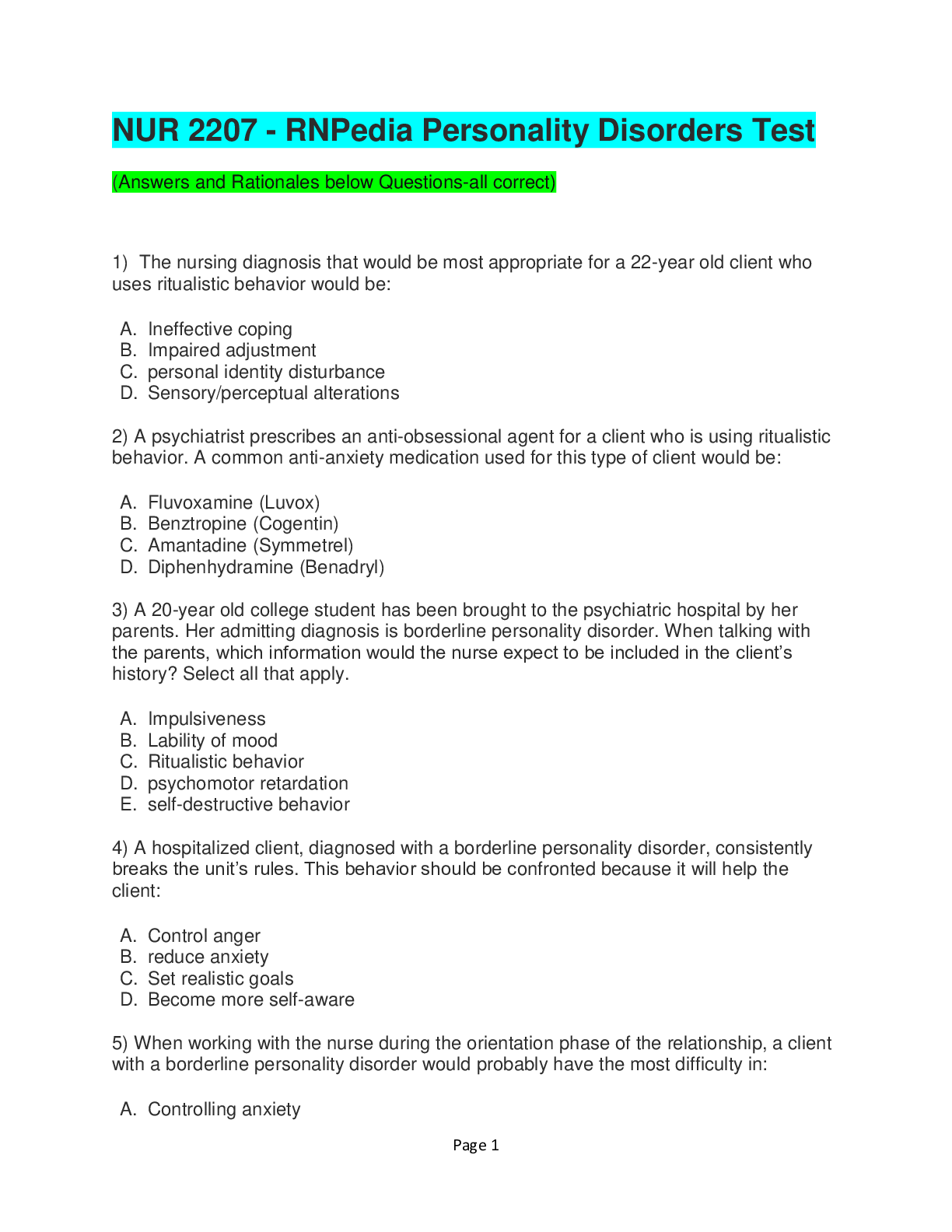
Buy this document to get the full access instantly
Instant Download Access after purchase
Add to cartInstant download
Reviews( 0 )
Document information
Connected school, study & course
About the document
Uploaded On
Mar 15, 2020
Number of pages
12
Written in
Additional information
This document has been written for:
Uploaded
Mar 15, 2020
Downloads
0
Views
80

